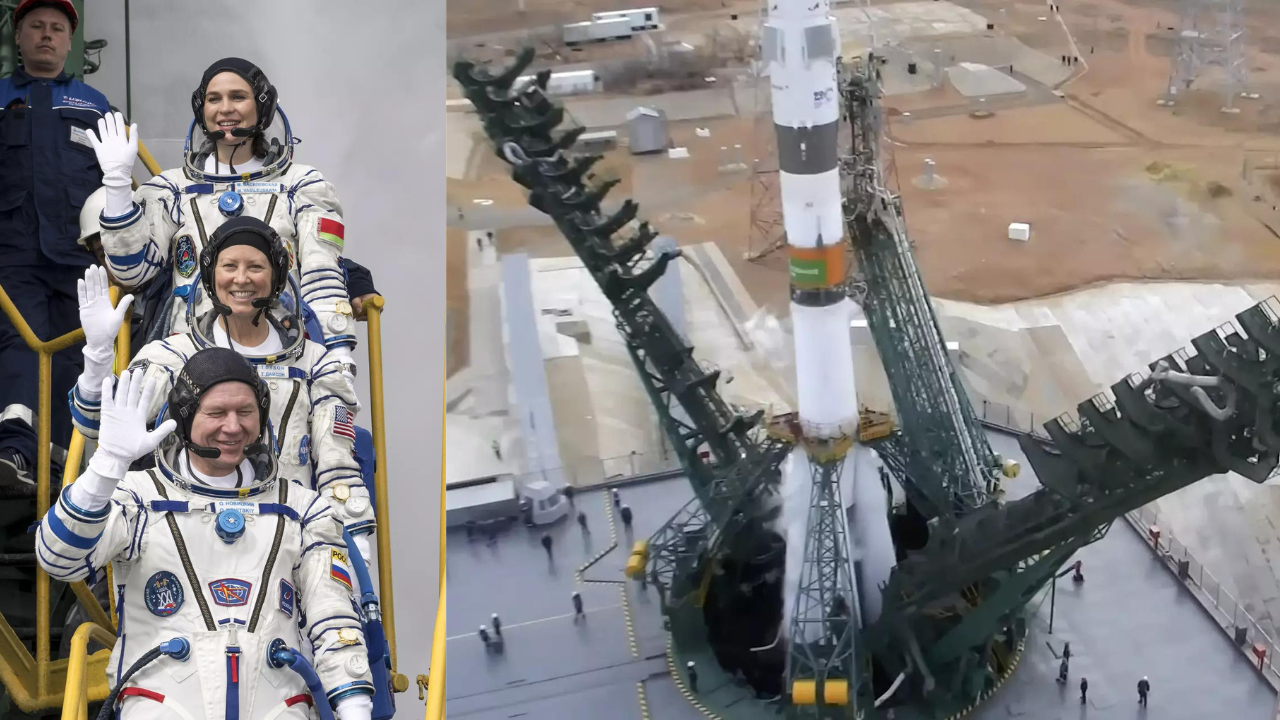NEW DELHI: A Russian Soyuz rocket successfully launched three astronauts to the International Space Station (ISS) on Saturday, following a two-day delay due to an aborted launch earlier in the week. The spacecraft, carrying Nasa astronaut Tracy Dyson, Russian Oleg Novitsky and Marina Vasilevskaya of Belarus, lifted off smoothly from the Baikonur launch facility in Kazakhstan.
The initial launch, scheduled for Thursday, was halted just 20 seconds before liftoff due to an automatic safety system triggered by a voltage drop in a power source, according to Yuri Borisov, the head of the Russian space agency.However, the rocket’s second attempt proceeded without incident.
After eight minutes, the space capsule atop the rocket separated and entered orbit, embarking on a two-day, 34-orbit journey to reach the ISS. Originally, if the launch had proceeded as planned on Thursday, the trip would have been significantly shorter, requiring only two orbits. Docking at the ISS is now anticipated to occur at 1510 GMT on Monday.
Upon arrival, the three astronauts will join the current ISS crew, which includes Nasa astronauts Loral O’Hara, Matthew Dominick, Mike Barratt, and Jeanette Epps, along with Russians Oleg Kononenko, Nikolai Chub, and Alexander Grebenkin. Novitsky, Vasilevskaya, and O’Hara are slated to return to Earth on April 6.
The ISS, emblematic of post-Cold War international collaboration, stands as one of the few remaining areas of cooperation between Russia and the West amidst strained relations, particularly in light of Moscow’s military actions in Ukraine. Nasa and its partners aim to continue utilizing the space station until at least 2030.
Despite geopolitical tensions, Russia persists in relying on modified versions of Soviet-designed rockets for launching commercial satellites, as well as transporting crews and cargo to the ISS.
(With agency inputs)
The initial launch, scheduled for Thursday, was halted just 20 seconds before liftoff due to an automatic safety system triggered by a voltage drop in a power source, according to Yuri Borisov, the head of the Russian space agency.However, the rocket’s second attempt proceeded without incident.
After eight minutes, the space capsule atop the rocket separated and entered orbit, embarking on a two-day, 34-orbit journey to reach the ISS. Originally, if the launch had proceeded as planned on Thursday, the trip would have been significantly shorter, requiring only two orbits. Docking at the ISS is now anticipated to occur at 1510 GMT on Monday.
Upon arrival, the three astronauts will join the current ISS crew, which includes Nasa astronauts Loral O’Hara, Matthew Dominick, Mike Barratt, and Jeanette Epps, along with Russians Oleg Kononenko, Nikolai Chub, and Alexander Grebenkin. Novitsky, Vasilevskaya, and O’Hara are slated to return to Earth on April 6.
The ISS, emblematic of post-Cold War international collaboration, stands as one of the few remaining areas of cooperation between Russia and the West amidst strained relations, particularly in light of Moscow’s military actions in Ukraine. Nasa and its partners aim to continue utilizing the space station until at least 2030.
Despite geopolitical tensions, Russia persists in relying on modified versions of Soviet-designed rockets for launching commercial satellites, as well as transporting crews and cargo to the ISS.
(With agency inputs)


